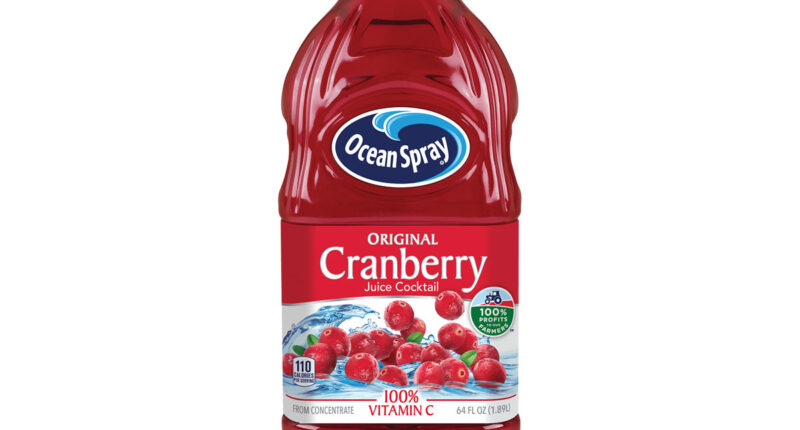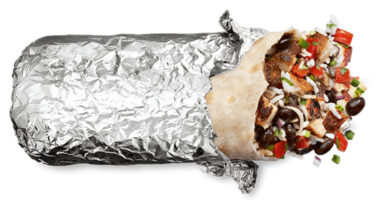7 Worst Juice Brands to Stay Away From Right Now – The product recommendations in this post are recommendations by the writer and/or expert(s) interviewed and do not contain affiliate links. Meaning: If you use these links to buy something, we will not earn a commission.
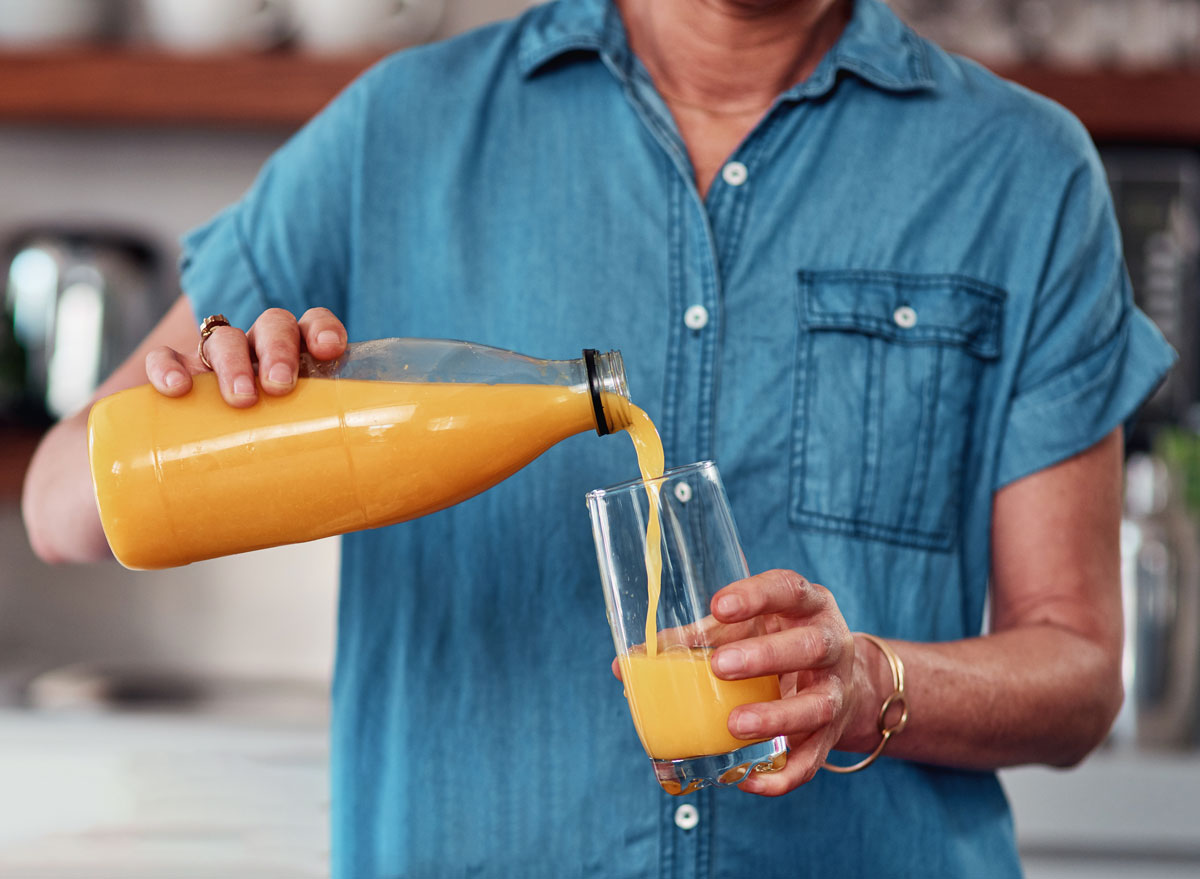
In theory, juice should be a healthy beverage—it’s made from fruit, after all, right? Unfortunately, though, many of the bottled juices stocking the shelves at your local supermarket contain very little actual fruit—and a whole lot of added sugar.
Studies show that sugar-sweetened beverages are the single largest source of calories and added sugar in the U.S. diet. These drinks don’t really fill you up, nor do they provide much nutritional value. That’s why they’re often referred to as “empty calories.” According to Harvard Health, if you were to drink one 150-calorie fruit punch every day, you could gain up to 5 pounds by the end of the year. Even if weight gain isn’t a concern for you, keep in mind that regularly drinking high-sugar beverages can increase your risk of heart disease, type 2 diabetes, and even certain cancers.
That’s why Eva De Angelis, BSND, a licensed dietitian nutritionist and contributor at Health Canal recommends only choosing products that are made with 100% real fruit juice—and nothing else.
“This is the best quality option,” she says. “When you see juices that are made with a lower percent of fruit juices, the rest is usually syrups or a mix of water and sugar—not to mention added flavoring and coloring to compensate for the lack of real fruit.”
With all that in mind, here are some juice brands you’ll definitely want to steer clear of on your next shopping trip.
What makes a store-bought juice unhealthy
Experts say these factors can help you identify juice brands that are less nutritionally beneficial.
- High amounts of added sugar: As a general rule, the more added sugar a juice contains, the worse it is for you, according to Krutika Nanavati, MS, a Ph.D. candidate in the School of Sport, Exercise, and Nutrition and licensed nutritionist with ClinicSpots.
- Low to no vitamin content: Juice should always contain vitamins—if they don’t, they’re likely made with very little real fruit, says Jesse Feder, MS, RDN, a personal trainer and registered dietitian with the My Crohn’s and Colitis Team.
- Questionable additives: “Some store-bought juices contain other ingredients that can reduce their health benefits even further—like artificial flavors and colors, preservatives, and thickeners,” explains Nanavati. Kelsey Costa, MS, RDN, a registered dietitian nutritionist with the National Coalition on Healthcare, recommends looking out for Red 40, Yellow 5, and Yellow 6 dyes, which can contain small amounts of benzidine, a known cancer-causing chemical.
Now that you know what to look for on juice bottle nutritional labels, let’s take a look at some of the worst offenders. Here are the unhealthiest juices you should always leave on grocery store shelves. Read on, and for more, don’t miss
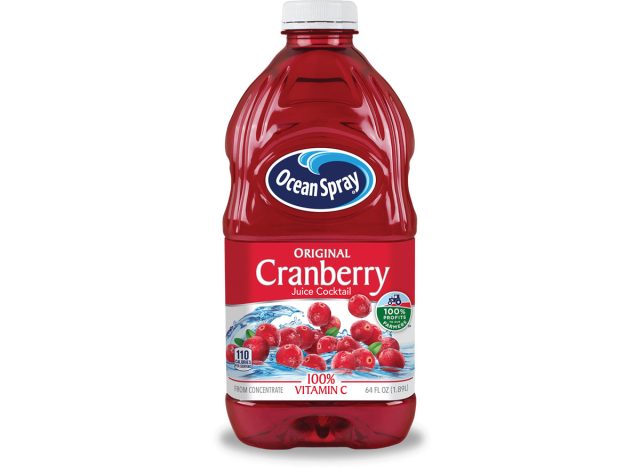
PER SERVING (8 FL OZ): 110 calories, 0 g fat, 45 mg sodium, 28 g carbs, 0 g fiber, 25 g sugar (23 g added sugar), 0 g protein
Anytime you see the word “cocktail” in the product name, that’s a red flag, says Nanavati. Unlike other products that are labeled 100% juice, this Ocean Spray Cranberry Juice Cocktail contains added sugar—more specifically, 23 grams of added sugar per serving. Sure, this juice does supply vitamin C, but that’s really the only perk here—and the fact remains that the third ingredient after water and cranberry juice is sugar.
By the way—Costa points out that the diet version of this drink isn’t necessarily better for you. While it only has 1 gram of sugar, it contains two different kinds of artificial sweeteners, significantly less vitamin C (20% of your daily value versus 100%), and multiple preservatives to extend the shelf life.
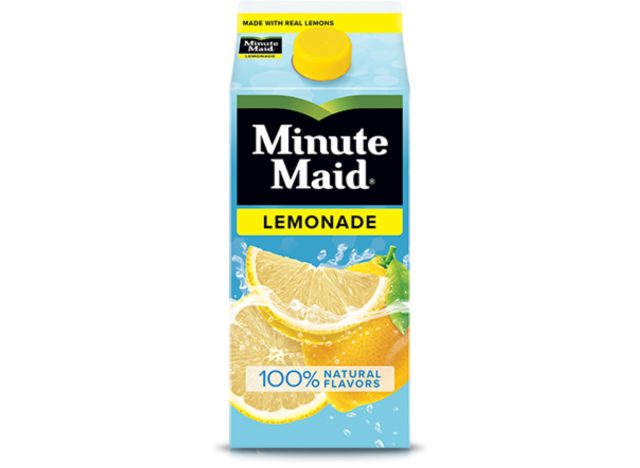
PER SERVING (8 FL OZ): 70 calories, 0 g fat, 15 mg sodium, 18 g carbs, 0 g fiber, 17 g sugar (17 g added sugar), 0 g protein
This product is made from real lemons—but the reality is, it’s only 12% lemon juice. That explains why it doesn’t offer much vitamin C, a nutrient that lemons are naturally high in. The remainder of the juice is made up primarily of—you guessed it—added sugar and water. More specifically, Feder and Nanavati point out that Minute Maid Lemonade contains high fructose corn syrup, as well as two different kinds of artificial sweeteners.
Research has shown that high fructose corn syrup promotes obesity and increases your appetite more than regular table sugar. A 2023 study found that sucralose, one of the artificial sweeteners in this lemonade, not only damages DNA but can also contribute to a leaky gut—an intestinal condition that allows bacteria and toxins into the bloodstream.
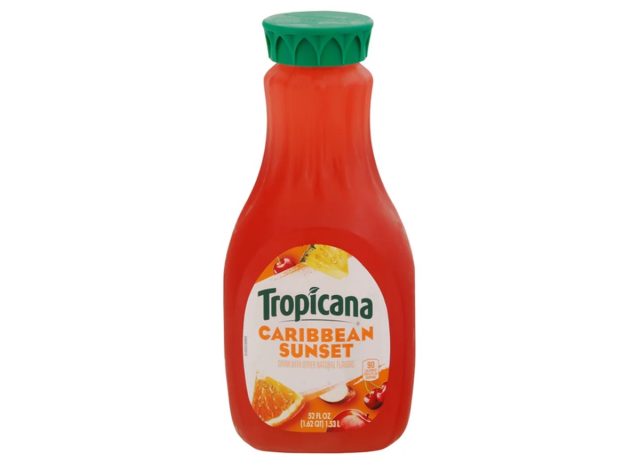
PER SERVING (8 FL OZ): 90 calories, 0 g fat, 5 mg sodium, 21 g carbs, 0 g fiber, 21 g sugar (17 g added sugar), 0 g protein
“This juice provides very little nutritional value,” says Nanavati. Tropicana Caribbean Sunset only offers about 10% of your daily value for vitamin C—probably because the main ingredients in this beverage are water and sugar. Out of the whopping 21 grams of sugar in this drink, 17 grams are added sugar.
That also translates to 21 grams of carbohydrates, which is about the equivalent of two slices of wheat bread.
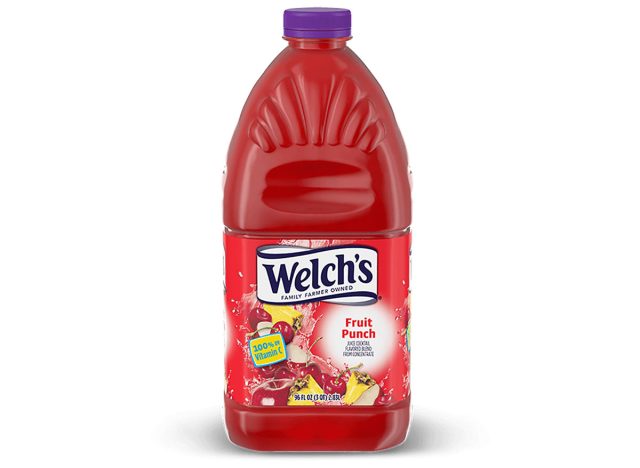
PER SERVING (8 FL OZ): 100 calories, 0 g fat, 22.5 mg sodium, 24.5 g carbs, 0 g fiber, 23 g sugar (22 g added sugar), 0 g protein
An 8-ounce serving of this juice contains about 50% of your daily value for vitamin C. Aside from that, though, this beverage offers almost no nutritional benefits—and a number of drawbacks.
“The first two ingredients in Welch’s Fruit Punch are water and high fructose corn syrup,” says Feder. “It’s high in added sugars, which can lead to unwanted weight gain and chronic diseases when consistently consumed. Additionally, it lacks several important vitamins and minerals and has no significant nutritional value.”
This product also contains the zero-calorie sweetener sucralose, which some studies have found may cause an imbalance in the gut microbiome, as well as reduce insulin sensitivity.
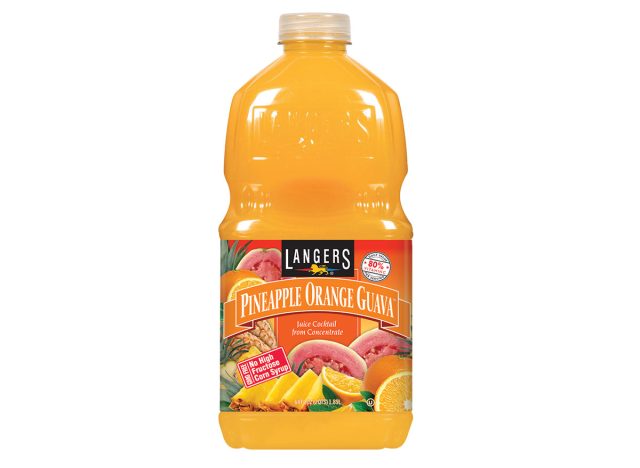
PER SERVING (8 FL OZ): 120 calories, 0 g fat, 22.5 mg sodium, 31 g carbs, 0 g fiber, 27 g sugar (23 g added sugar), 0 g protein
Imagine pouring 5 ½ teaspoons of sugar into your drink—that’s precisely how much is in one serving of Langers Pineapple Orange Guava juice.“It’s also only 15% real juice, meaning it’s primarily composed of added sugar and water,” says Costa.
Did we mention that it packs 31 grams of carbohydrates, which is more than a slice of pizza?
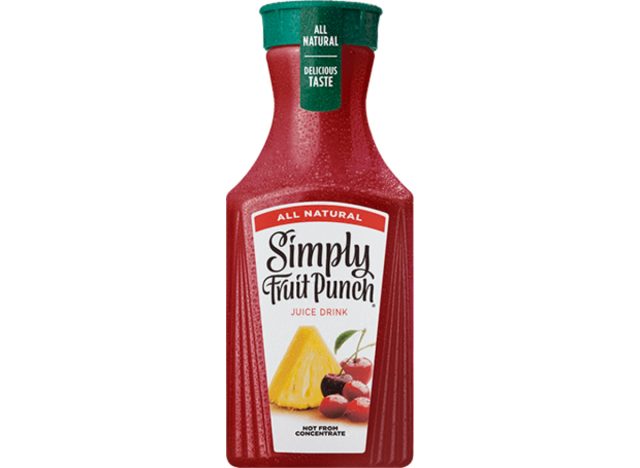
PER SERVING (8 FL OZ): 199 calories, 0 g fat, 15 mg sodium, 25 g carbs, 0 g fiber, 25 g sugar (21 g added sugar), 0 g protein
Across the board, dietitians agree that fruit punches should generally be avoided. That’s because they’re usually sugar bombs, and contain very little actual fruit juice.
Take Simply Fruit Punch, for example. The name is a bit misleading, says De Angelis, considering that sugar is the second ingredient on the label before any fruit juices. “With just one serving you almost reach half of the World Health Organization’s recommended maximum sugar intake,” she says.
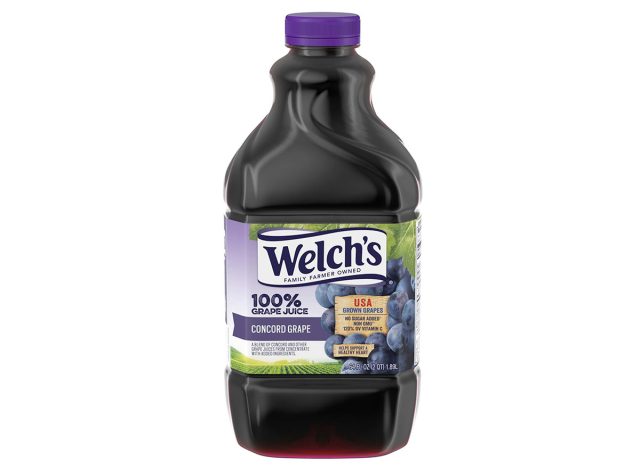
PER SERVING (8 FL OZ): 140 calories, 0 g fat, 10 mg sodium, 37 g carbs, 0 g fiber, 35 g sugar (21 g added sugar), 1 g protein
At first glance, it might seem like this juice is pretty harmless—after all, it’s made with 100% non-GMO juice and contains no added sugar, flavors, colors, or preservatives. However, take a peek at the nutrition label and you’ll notice that it contains a staggering 140 calories, 35 grams of sugar, and 37 grams of carbohydrates per serving, so it is a very unhealthy juice. Worse yet, a 2019 Consumer Reports study found that it contains concerning levels of lead and arsenic.
Consumer Reports tested 45 juices across 24 popular national brands, to determine the levels of cadmium, lead, mercury, and inorganic arsenic—all of which pose known risks to human health. By and large, grape juice was found to be the most problematic in terms of the content of these contaminants. After evaluating the levels of heavy metals in these juices, Consumer Reports calculated how much of each product could be considered harmful to consume—and drinking just ½ cup of Welch’s 100% Grape Juice Concord Grape per day could pose health risks to both adults and children.
